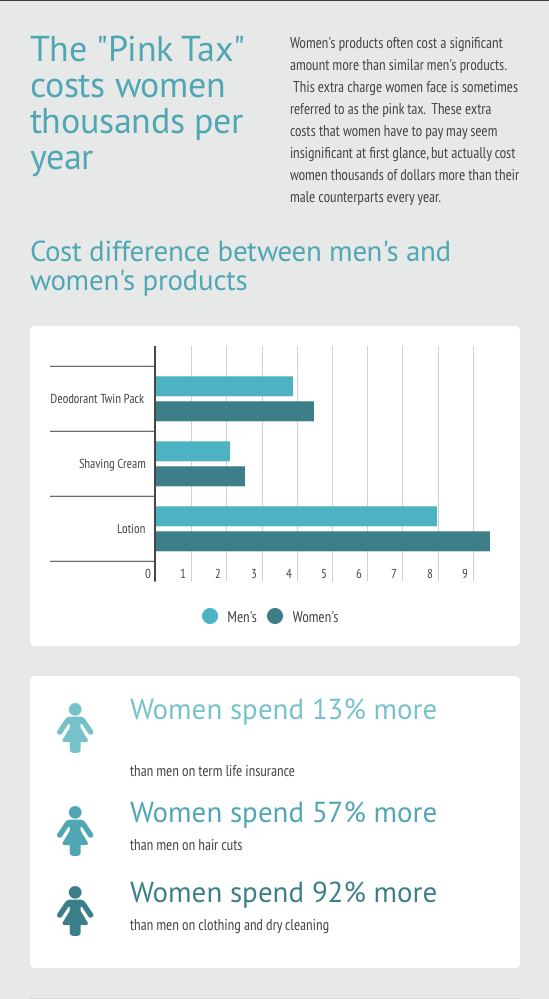Pink tax costs women thousands more than men
April 7, 2016

“The Pink Tax” is a term that refers to the extra charge that women face when purchasing products or services. When buying one product, the price difference may not be that noticeable, but every year on average, each woman pays over $1000 more than men do. This extra fee is an injustice to women across the world.
The Pink Tax takes effect in many stores and services across the world, though in some places it makes itself more apparent. Over 42 percent of women’s products are priced higher than men’s. Women are being charged up to $5 more than men for essentially the same products, with the exception of packaging, making the extra cost extremely unfair. If the product is the same, the cost should also be the same, regardless of gender. Though it’s most commonly looked at in the prices of hygiene products, the Pink Tax also affects clothing prices, vehicle repair prices, and dry cleaning prices. Although there may be slight differences in the products and services for women, the size of the price difference is inexcusable.
Between shampoos, razors, haircuts and dry cleaning, the extra costs that women are paying add up. While the extra dollar may look like a small amount at the time, it is estimated that over one year, the Pink Tax costs women around $1351 extra, according to Listen Money Matters.
The number should not be nearly that high. The fact that women are putting that $1351 to a prettier package or a slightly better scent is upsetting, especially when that money could be used to buy more products for themselves to use.
The most common area where the pink tax is noticed is hair. According to Listen Money Matters, Women spend an estimated 48 percent more than men on hair products, while also spending an additional 57 percent extra on haircuts. On just hair products and haircuts alone, this adds up to about $400 a year.
While women’s hair is slightly more high maintenance than most men’s, $400 is a large price to pay. Shampoos are all mostly the same, with the exception of scent, so it does not make sense that women are paying dollars more for a bottle. Regardless of whether you are cutting off 4 centimeters or 4 inches, a haircut is still just a haircut, and the extra 57 percent that women pay is unnecessary.
Most of the time that the Pink Tax occurs, the products that are being purchased are usually around the same quality, some women have come to notice that the men’s version of products actually works better while also costing less, according to Susan Taylor of U.S. News. One Atlanta woman has been buying men’s razors since she was a teen, due to the fact that they stay sharp longer.
While charging women more than men for the same product is already a horrible injustice, it becomes even worse with the realization that sometimes the cheaper men’s products are of higher quality. This added fact shows the discriminatory aspect of marketing, and makes the Pink Tax even more unacceptable.
The Pink Tax is not only unfair to women, but also has no logical explanation behind it. Women should never have to pay more than men for a product that is essentially the same. Women and businesses should work together to end the Pink Tax.








Noah Linder • May 5, 2016 at 9:14 pm
The article uses facts and data VERY well. It is easy to spit out your opinion and screw objectivity but you did a good job at staying kosher. I would add some guesses or hypothesis as to WHY you think or others think the Pink Tax exists and offer some insight as to combat it.
Cole Lebourgeois • May 4, 2016 at 6:01 pm
I like this article because there are two very distinct sides of the argument, you either disagree with it or agree with the Pink tax. It really doesn’t make any logical sense to have different prices but then at the same time it does because lets face it most women try to look and feel the best they can about themselves and some of the products they buy might have more expensive things in it than the men’s and if they really want to just go to the mens area and buy stuff there if it really matters.